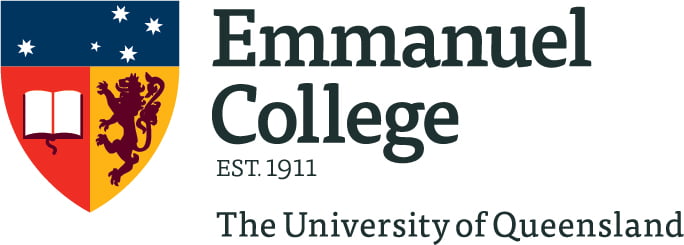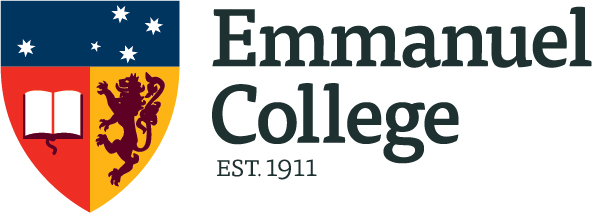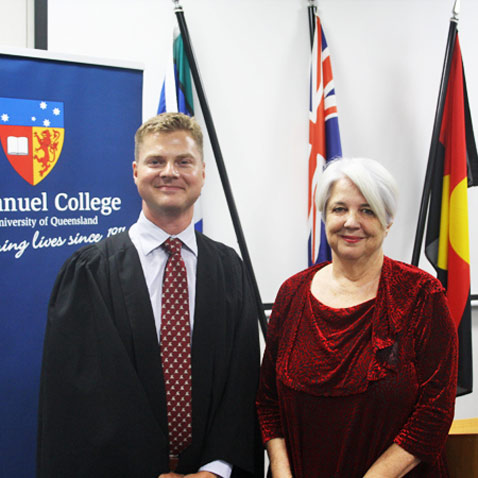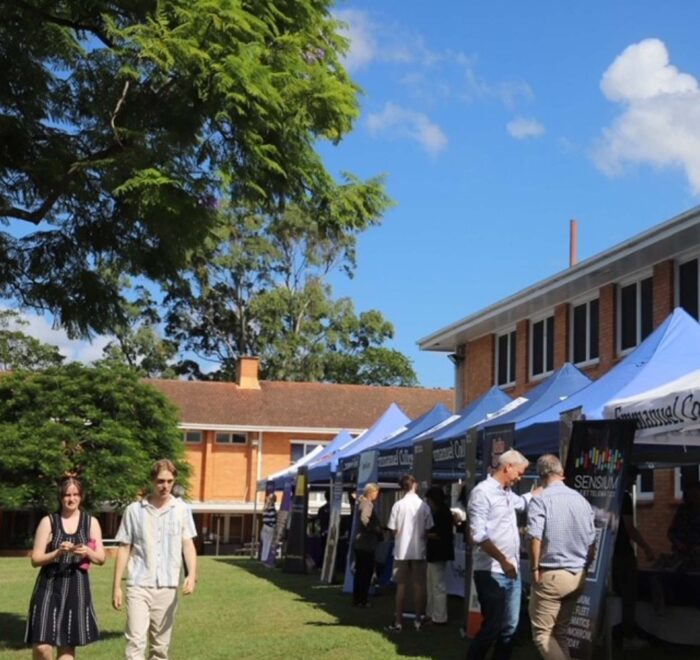Speech by Associate Professor Rain Liivoja, TC Beirne School of Law, The University of Queensland at the Emmanuel College Academic Awards, 14 March 2019
We meet today on the lands of the Turrbal and Jagera peoples, who have loved and nurtured this land for millennia. They have performed here age-old ceremonies of celebration, initiation and renewal. Their sovereignty in this land has never been ceded or extinguished. I pay my respects to the past, present and emerging elders of all Aboriginal and Torres Strait Islander peoples.
Let me start by congratulating those of you who are being recognised tonight for various accomplishments. I don’t know you personally, which is a shame, but I’m sure that the prizes and awards are well-deserved. So, well done — and keep it up! I would also like to acknowledge the dedication and hard work of everyone here. What all of you have achieved last year is a credit to you, this College and this University. It’s both a pleasure and a privilege to spend this evening with you.
Events such as this one are significant. They are occasions to come together as a community and celebrate achievement. It’s really important that we do so. It’s all too easy to get fixated on the things that did not go so well: the forgotten assignment deadline; the nightmarish job interview; the disastrous second date; the Instagram post that only got 12 likes. Yet we often fail to stop and reflect on things that did go well or, indeed, to celebrate our successes. So, take this opportunity to pat yourself, and each other, on the back for a great year.
Some of you have had to overcome adversity to be here and excel at whatever it is that you are good at. Perhaps you or a loved one have struggled with an illness or disability. Perhaps you’ve encountered discrimination because of your gender, ethnicity, race, religion, or gender or sexual identity. Perhaps you’ve had to make significant personal or financial sacrifices to study at university. If you are receiving an award tonight despite such challenges, I applaud your resilience and determination.
Let me also say something on behalf of my academic colleagues — your lecturers and tutors. Your success is an immense source of satisfaction and pride for us. Every year, my colleagues and I finish teaching periods by marking hundreds of papers, often holed up at home, wearing pyjamas, for days on end. It’s immensely gratifying to read a paper and think to oneself, “Wow, this is just awesome”. Giving a seven feels just as good as getting one, if not better. So, thank you for that!
Having said all of this, we should all be careful not to bask endlessly in the glory of our success. For starters, it’s not very attractive: no-one likes a show off. But there’s something more fundamental at stake here, too.
In the past, whenever someone congratulated me on some academic or professional achievement and said, “You’ve been so lucky”, I used to respond (only half-jokingly) by saying, “Luck has little to do with it, it’s all hard work”. I’ve stopped doing that. Partly because that’s not a very generous way to respond to someone who is being nice to you, but, also, because there is a degree of luck involved in what we achieve. Luck is perhaps an odd word here, as it smacks of scratchies and pokies. But we could also call it good fortune, or privilege.
All of us in this room have had good fortune and have been privileged in one way or another. I’m a highly educated, white, healthy, cis-gender man with a fulfilling permanent job. So, I know a thing or two about privilege. And so do you. We’re at a dinner where we are being served a three-course meal. Just chew on that for a while. We didn’t grow what we’re eating; we didn’t cook it; we didn’t even have to go to the kitchen to get it.
Also, we didn’t have to walk 20 miles this morning for firewood and fresh water. We don’t have to dodge land mines or armed thugs on our way to class tomorrow. Should we get sick, we’ll have access to some the best healthcare in the world — without the risk of going broke.
I’m not being very original here. We are increasingly being asked to reflect upon and acknowledge our privilege. Rightly so. Sometimes, these suggestions can sound like accusations, and we are invited to accept blame. I don’t think that’s very helpful. But I also think that simply acknowledging privilege is not enough, even though it’s an important first step. I suggest to you — and this is really my take-home message — that we need to do at least two things.
First, we should acknowledge the people who have contributed to the successes that we’ve had — the people who have supported us in one way or another. These may be parents or grandparents, siblings, significant others, friends, teachers, lecturers, coaches, College staff members, benefactors who have funded scholarships and so on. I encourage you to let them know what their support has meant to you.
The second thing is to support those less privileged. Unfortunately, there’s no shortage of people who are doing it tougher than us, so there’s plenty that we can do. We can start with the mundane, like dropping off the clothes that we no longer wear at a charity op-shop. We can tutor refugee children at a homework club. We can go and build houses in Cambodia. We can donate to literacy programs for Indigenous children. We can write letters to seek the release of political prisoners in Myanmar. And so on, and so on.
We should not think of volunteering or charitable giving as CV-padding exercises. Nor should we see this as some exceptional form of generosity for which we deserve praise. No. This is a moral obligation. Or, to put it in really crude terms, charitable deeds are the price that we ought to pay for our privilege.
One possible objection to what I’ve been saying is that we didn’t ask for the privilege that we have. We’ve simply had good fortune. True. But we still benefit from it, sometimes at the expense of others, even if we try not to.
Also, one might say that the generations before you, and before me, have had it so good, that it’s really their responsibility to fix inequality in society. Yes and no. To be sure, those who have more, and have benefitted more, should also give more. But we also need to think of ourselves in the global context. While there are appalling inequalities within Australian society, spare a thought for the Democratic Republic of the Congo, the poorest country in the world. Their gross domestic product, per capita, is 0.85% of that of Australia. I apologise to the economists in the room for the oversimplification but, the DRC society is, on average, a hundred times poorer than ours. Don’t let this depress you, let it galvanise you!
So, celebrate tonight, but remember to look after those who have less cause to celebrate. Congratulations again to all of you!




